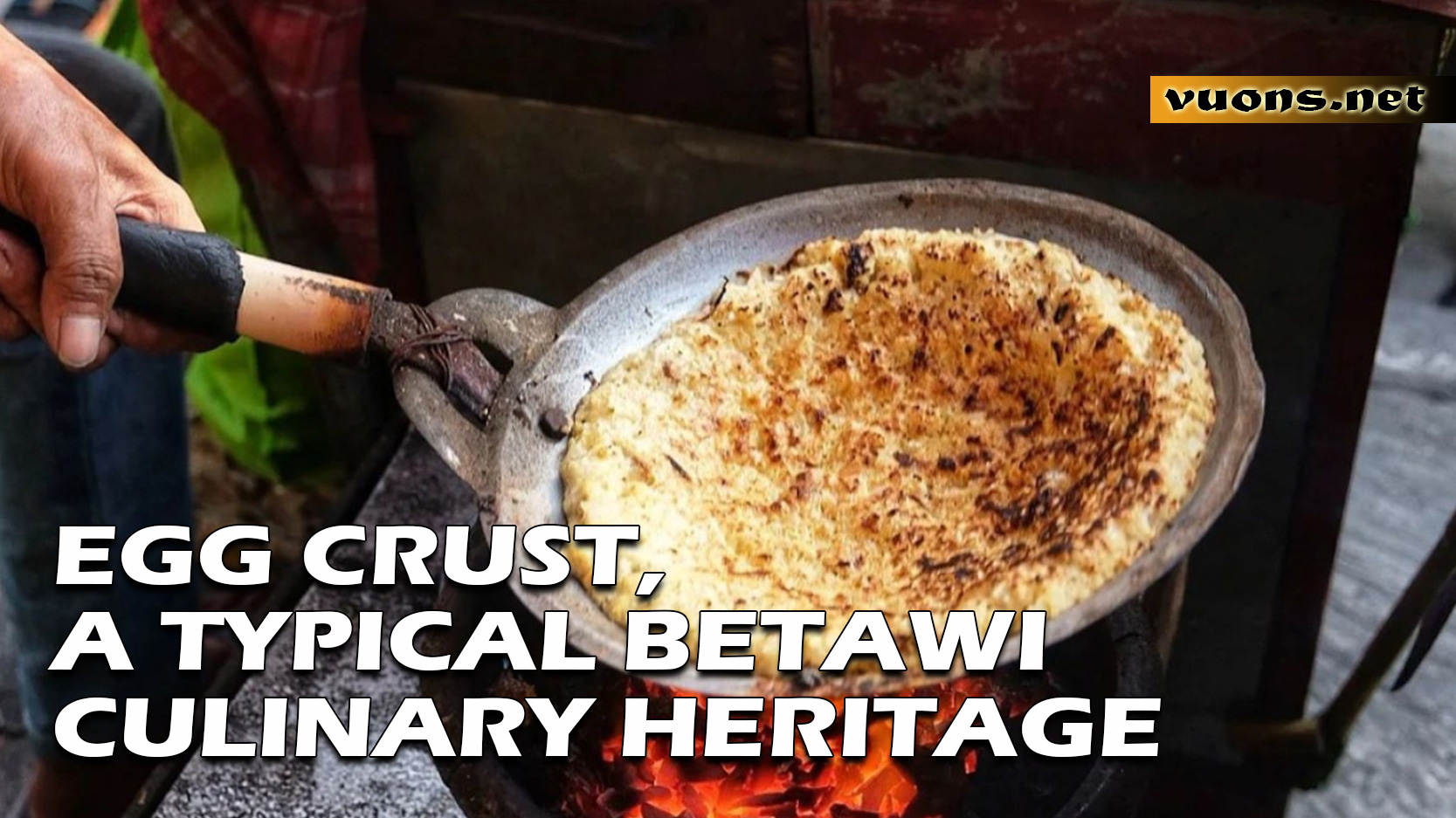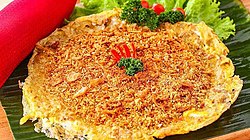Egg Crust and Betawi Culture: More Than Just Food
History of Egg Crust: Tracing Betawi Culinary Traces
Egg crust, one of the legendary Betawi culinary delights, has a long and rich history. This snack is known as a traditional food that is often found at major Betawi events, such as the Betawi Lebaran celebration and the Jakarta Fair. Egg crust is not just food, but also a symbol of Betawi people’s cultural identity.
The origins of egg crust can be traced to the 17th century, when Malay, Arabic and Chinese culinary influences began to merge in Jakarta. The unique combination of local ingredients such as sticky rice, eggs and grated coconut, with signature spices such as ebi (dried shrimp) and fried shallots, creates a rich and complex flavour. Cooked in the traditional way using a charcoal stove, Egg crust offers an authentic and irreplaceable culinary experience.
Egg crust was once the food of Betawi nobles and then spread to the general public. The manufacturing process requires patience and special skills, making it a culinary art. Nowadays, even though many modern snacks have emerged, Egg crust still maintains its charm and is a favorite at various cultural events.
With every bite of Egg crust, we not only enjoy the savory and crunchy taste, but also feel a piece of history and tradition that has been passed down from generation to generation. Egg crust is clear proof that food can be a bridge between eras, preserving and celebrating a rich and diverse cultural heritage.
Egg Crust Making Process: Between Tradition and Modernization
Egg crust, a typical Betawi snack, has a unique manufacturing process and is full of traditional values. Processing egg crust is not just cooking, but an art that requires patience and special skills. This traditional process starts with white sticky rice that has been soaked overnight. The sticky rice is then cooked half-cooked over a charcoal stove.
Next, chicken or duck eggs are added to the sticky rice, along with spices such as ebi (dried shrimp), fried shallots, and toasted grated coconut. This dough is then baked again over a charcoal stove using a small, flat iron skillet. One of the characteristics of egg crust is the cooking method which allows the mixture to become slightly charred on the bottom, creating a crunchy texture and distinctive taste.
Although traditional methods are still maintained, modernization also provides a new touch in making egg crust. Some sellers are now using gas stoves to speed up the cooking process. Apart from that, a variety of toppings such as cheese, minced meat and various modern sauces are starting to appear to meet the tastes of the younger generation. However, the essence and original taste of egg crust is still maintained.
Modernization in making egg crust has not only affected cooking techniques but also the way it is served. Today, egg crust is often served at various culinary festivals and modern restaurants, bringing this traditional snack closer to the wider community. Even though technology and tastes have changed over time, Egg crust remains a symbol of the resilience of Betawi culture which is able to adapt without losing its identity. In this way, egg crust continues to be sustainable, maintaining tradition while innovating for the future.
Egg Crust in Betawi Social Life and Ceremonies
Egg crust is not just a food, but also an integral part of Betawi social life and traditional ceremonies. In Betawi society, egg crust is often used as a symbol of togetherness and strong cultural identity. The presence of egg crusts at various traditional events emphasizes the importance of this snack in preserving traditions and building togetherness.
At big events such as Betawi Eid, weddings and celebrations, egg crust is always present as a mandatory dish. The manufacturing process which is carried out at the event venue adds to the festive atmosphere and becomes a special attraction for the guests. When guests gather around the charcoal stove, they not only enjoy the distinctive taste of Egg crust, but also share stories and strengthen social relationships.
Apart from celebrations, egg crusts are also present in Betawi traditional ceremonies such as circumcisions and land descent events. In the ground-breaking ceremony, which marks the first time a baby sets foot on the ground, the egg crust is presented as a symbol of hope and prayer that the child will grow up healthy and strong. This tradition shows how food can have a deep and sacred meaning in Betawi culture.
Egg crust is also often found at cultural festivals and culinary bazaars, where sellers demonstrate their skills in cooking Egg crust traditionally. This not only attracts tourists, but also teaches the younger generation about the importance of preserving culinary heritage. Through this festival, Egg crust serves as a bridge between the past and the present, connecting the older and younger generations in shared cultural pride.
With every plate of Egg crust, we not only enjoy the delicious taste but also experience the rich, meaningful Betawi culture. Egg crust is more than just a food; it is a symbol of togetherness, tradition and identity that continues to live on in every social event and traditional ceremony of the Betawi people.




